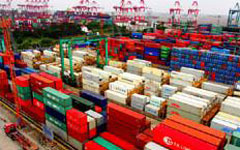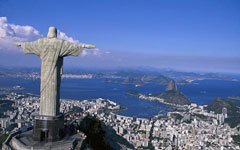Caution tempers trade optimism
By Xu Hongcai (China Daily) Updated: 2014-02-22 07:26Despite the challenges and uncertainties that lie ahead, this year is expected to be better than 2013 for imports and exports
General Administration of Customs figures show that in January, China's foreign trade increased 10.3 percent year-on-year to $382.4 billion. Exports increased 10.6 percent year-on-year to $207.13 billion, while imports increased 10 percent to $175.27 billion. This means China's foreign trade has maintained a relatively high growth over the past few months.
|
 |

|
China's exports to developed countries are likely to grow in the months ahead. But the continued appreciation of the yuan and slowing down of emerging economies' growth rates could have a negative impact on China's exports. So, we should not be too optimistic about growth in foreign trade this year. At best, this year's growth rate is expected to be between 8 and 9 percent.
The developments in four economic regions, the EU, ASEAN, Brazil and India, have to be understood to gauge the growth prospects of China's foreign trade in 2014. First, although the US economy is performing better than the EU's, trade between China and the EU is growing more rapidly.
Second, because of the currency appreciation and rising operation costs in China, the country's manufacturing industry is finding it difficult to attract foreign capital. In contrast, ASEAN member states, with which China's trade grew 11.3 percent in January, are drawing more foreign investments because of their lower production costs. As a result, many processing and manufacturing companies in China are shifting their production units to ASEAN member states.
And third, China's cooperation with Brazil and India hold greater potential because, apart from the traditional trade in commodities, some Chinese engineering and machinery enterprises are making large investments in the two emerging markets.
The January data is no doubt bullish, but such strong increase is difficult to sustain. Trade surplus in one month is not representative of China's foreign trade for a whole year, because there can be large fluctuations owing to factors such as trade policies and conflicts, change in orders and holidays. For instance, January 2014 had 22 working days, five days more than in last year when the weeklong Spring Festival holiday fell in the first month, prompting many experts to say that a lower comparative base last year - because of fewer working days - helped increase the growth rate this year.
Don't miss:
|
 |
 |
| China's top 10 richest cities |
- NHTSA says finds no 'defect trend' in Tesla Model S sedans
- WTO rare earth ruling is unfair
- Amway says 2014 China sales may grow 8%
- President Xi in Europe: Forging deals, boosting business
- CNOOC releases 2013 sustainability report
- Local production by Chery Jaguar Land Rover this year
- Car lovers test their need for speed in BMW Mission 3
- China stocks close mixed Monday

















